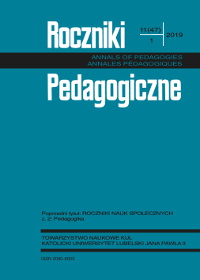The Relationship Between Male/Female Identities Along the Biblical-Christian Tradition: Guidelines for Today’s Educations
Main Article Content
Abstract
The article presents anthropological, philosophical and theological foundation of the relationship between male/female identities in the light of the biblical-christian tradition. The first part introduces the concept of the primary reciprocity in Gen 1-2 focusing on affinity and difference between man and woman as well as man and woman’s reciprocal essentiality. The second part pertains to male/female reciprocity according to the “theology of the body” by John Paul II which includes a broad notion of freedom. Lastly, the article describes educational tasks including the nuptiality of human body with regards to Christian personalization. Proposed pedagogical vision involves promoting male and female identities according to their difference and to their common dignity.
Article Details
References
Aristotle. Politics. Vol. I. 1253a.
Cassirer, E. (1953). The philosophy of symbolic forms. Vol. I. New Haven: Yale University Press.
Eshghinejad, S. Gritter, K. (2016). EFL students’ attitudes toward learning English language: the case study of Kashan University students. Cogent Education, 3, 1-13.
García Hoz, V. (2005). L’educazione personalizzata [Personalized education]. Brescia: La Scuola.
Heraclitus. Fragments. n. 2.
John Paul II. (1980). Revelation and discovery of the nuptial meaning of the body (9/1/1980), n. 5.
John Paul II. (1980a). The man-person becomes a gift in the freedom of love (16/1/1980), n. 5.
John Paul II. (1988). Mulieris dignitatem (15/8/1988), n. 7.
John Paul II. Man becomes the image of God by communion of persons (14/11/1979), n. 1.
Kongregacja Nauki Wiary (2004). List do Biskupów Kościoła katolickiego o współdziałaniu mężczyzny i kobiety w Kościele i świecie, (31/5/2004).
Mullola, S. Ravaja, N. Lipsanen, J. Alatupa, S. Hintsanen, M. Jokela, M. Keltikangas Järvinen, L. (2012). Gender differences in teachers’ Pperceptions of students temperament, educational competence and teachability. British Journal of Educational Psychology, 82, 185-206.
Pahlke, E. Shibley, J. Allison, A.M. (2014). The effects of single-sex compared with coeducational schooling on students’ performance and attitudes: a meta-analysis. Psychological Bulletin, 4, 1042-1072.
Peeters, M. (2013). Gender – światowa norma polityczna i kulturowa. Warszawa: Wydawnictwo Sióstr Loretanek.
Voyer, D. Voyer, S.D. (2014). Gender differences in scholastic achievement: a meta-analysis. Psychological Bulletin, 4, 1174-1204.
